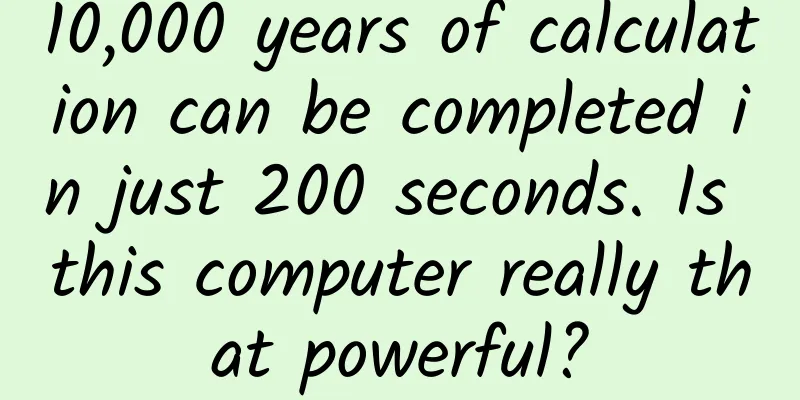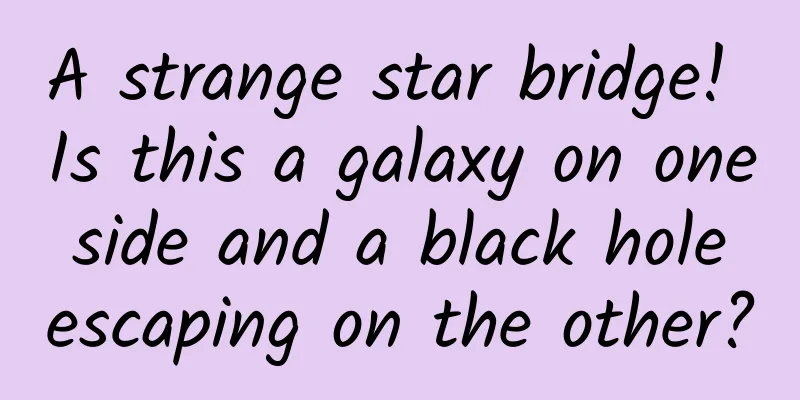10,000 years of calculation can be completed in just 200 seconds. Is this computer really that powerful?

|
Quantum computing is big news again! In July 2023, the quantum computing team from Google published its latest research results on the arXiv preprint library. The company's quantum computer "Sycamore" has been iteratively upgraded and has capabilities that exceed all current classical supercomputers, thus "once again" verifying "quantum supremacy." “Quantum supremacy” The Dawn of the Quantum Age Perhaps in many people's impressions, the fastest computing devices in the world are supercomputers, such as the well-known "Sunway TaihuLight" and "Tianhe-2". In May 2023, the latest issue of the Top500 Supercomputers also showed that the Frontier supercomputer at the Oak Ridge National Laboratory (ORNL) in the United States won the world's fastest ranking with a performance of 1.194 Eflop/s (100 billion times). However, scientists and engineers in the field of quantum physics are using quantum technology to overturn this history. The Frontier Classic supercomputer at Oak Ridge National Laboratory (ORNL). Image credit: Carlos Jones/ORNL, US Dept. of Energy In fact, whether it is a supercomputer or a commercial laptop, they are all classical computers. Compared with classical computers, quantum computers have greater advantages in theory. Classical computers use bits as the basic computing unit, which can only represent 0 or 1 in a deterministic way and are used to perform binary operations on data. In contrast, quantum computers use a completely new computing method, and their basic computing unit is the quantum bit (qubit). A quantum bit has the property of superposition and can represent the superposition state of 0 and 1 at the same time, that is, a quantum bit can be in the 0 state and the 1 state at the same time with a certain probability. It is precisely because of this unique property of quantum bits that quantum computers can perform parallel calculations in a 0/1 superposition state , thus theoretically possessing exponentially more powerful computing power than classical computers. Quantum computing is far more powerful than classical computers. Copyright image from the library. Reprinting and using may cause copyright disputes But before Google released its new results, the advantages of quantum computers existed only in theory. Although physicist Richard Feynman proposed the concept of quantum computers as early as 1981, quantum physicists and engineers around the world have spent countless time and energy and have still not been able to build a universal quantum computer. In 2012, quantum theoretical physicist John Preskill proposed the concept of " Quantum Supremacy ", namely: quantum computers need to demonstrate the ability to surpass classical computers in solving specific problems, thereby solving computing tasks that even supercomputers cannot solve in a short period of time. Richard Feynman (left); John Preskill (right). Image source: Wikipedia Although the development of quantum computers is still in its infancy and may not have much practical value in solving a specific problem, as long as quantum computers can demonstrate their "quantum superiority", there is enough reason to believe that the era of quantum computing is coming. Quantum Computing vs Classical Computing A feint by quantum computers The realization of the concept of "quantum supremacy" is considered an important milestone in the history of quantum computer development. This "specific problem solving" usually requires the following two conditions to be met: First, this problem is suitable for processing using quantum computers, thus unleashing the potential of quantum computing; Secondly, the calculation of this problem needs to be complex enough for a classical computer, but at the same time, the correctness of the calculation results can still be verified by a classical computer. This kind of "specific problem solving" usually includes: "Quantum Random Circuit Sampling", "Quantum Random Walk" and "Boson Sampling". As long as a quantum computer consumes far less computing resources or takes far less computing time than the most advanced classical supercomputer in solving this specific problem , it can fully demonstrate its "quantum superiority". The 53-qubit quantum computer "Sycamore". Image source: Reference [1] In order to achieve "quantum supremacy", as early as October 2019, Google's quantum computing team took the lead in performing 20 cycles of operations on the company's 53-qubit quantum computer "Planeta" for the "quantum random circuit sampling" computing task , a total of 1 million samples, and the required computing time was only 200 seconds. The fidelity of the final computing result was 0.224% (the lower the value, the higher the accuracy). If the same result is calculated using Summit, the fastest classical supercomputer at the time, it would take about 10,000 years. Therefore, Google's quantum computing team claimed to be the first to achieve "quantum supremacy" . It is worth mentioning that the quantum gate accuracy of the quantum computer "Plane Tree" has reached a very high level, with the accuracy of single-qubit gates and double-qubit gates reaching 99.84% and 99.38% respectively, and the detection accuracy also reached 96.2% (the qubit gate will be explained below). Sundar Pichai, then CEO of Google, also excitedly stated: Although quantum computers have only demonstrated capabilities that surpass classical computers in solving a specific problem, this is like the Wright brothers' first successful test flight of an airplane, and it is a milestone in the history of the development of quantum computing. However, many scientific research groups and research institutions soon questioned Google's research results. Google's claim of "quantum supremacy" turned out to be a "false alarm" for quantum computers. Classical computing strikes back I can even calculate faster than you! In fact, the computational task of "quantum random circuit sampling" is not that mysterious. Simply put, the problem is to randomly select a single-qubit gate from a set of quantum gates to act on the qubit, and between each single-qubit gate there is a layer of double-qubit gates. The "qubit gates" mentioned here are used to perform specific operations on quantum bits, which are similar to logic gates in classical computing. They can change the state of quantum bits and allow us to manipulate and process quantum information. Among them, common qubit gates include single-qubit gates and double-qubit gates. Single-qubit gates are used to operate a single qubit, such as changing its state. Double-qubit gates are used to operate two qubits, such as achieving interaction and entanglement between qubits. By combining different qubit gate operations, more complex quantum circuits can be constructed to perform specific quantum computing tasks. The computational task of "quantum random circuit sampling" is like the sandwich cookies we used to eat as children. Single/double quantum bit gates are stacked layer by layer, so that the final quantum bit state is measured after repeated operations (that is, a sampling is completed). Schematic diagram of random quantum circuit sampling. Image source: Reference [1] The original intention of the Google team to choose this computing task was relatively simple: First, many theoretical scholars have proved that the computational task of "quantum random circuit sampling" is quite difficult on classical computers; Second, this computing task is very suitable for the quantum computer "Planeta" they developed. However, IBM questioned the Google team's achievement because if more efficient data storage and optimized calculations are used, the time required to complete the "quantum random circuit sampling" task using the classic supercomputer Summit can be greatly shortened to only 2.5 days! In addition, Zhang Pan's team at the Institute of Theoretical Physics of the Chinese Academy of Sciences also questioned this result. They proposed a new simulation method that greatly reduced the computational complexity and solved the problem in 15 hours using only 512 Tesla V100 32GB GPUs. If a more powerful classical supercomputer is used, the required computing time can even be shortened to tens of seconds. Optimization algorithm of Zhang Pan's team at the Institute of Theoretical Physics, Chinese Academy of Sciences. Image source: Reference [2] In other words, after hardware upgrades and algorithm optimization, the computing time required by classical supercomputers can even be shorter than that of the quantum computer "Plane Tree". This means that the counterattack of classical computing has been effective and has overturned the "quantum supremacy" previously claimed by Google in terms of computing time. The re-evolution of quantum computing It's time to show real power In fact, "quantum supremacy" itself is a competition between the emerging quantum computing and mature classical computing, which is a benign competition. On the one hand, as the number of quantum bits in quantum computers continues to increase and their own computing error rate continues to decrease, quantum computers will eventually show great potential in certain specific computing tasks; on the other hand, the development of quantum computers will further promote people's optimization of classical computing and resource integration , thereby continuously improving the algorithm efficiency and engineering scale of classical computers. This time, Google's quantum computing team regrouped and upgraded the original "Plane Tree" quantum computer, which had only 53 qubits, to a second-generation quantum computer with 70 qubits. This time, they launched a new round of challenges to classical computers with the upgraded quantum computer. The computational results of the phase change problem in “Random Circuit Sampling”. Image source: Reference [3] This time, the Google team chose the phase change problem in "random circuit sampling" (which can be simply understood as an upgraded version of the 2019 "quantum random circuit sampling" task). The paper they published claimed that the use of a new generation of quantum computers can complete computing tasks instantly, while if the latest number one supercomputer Frontier is used, it will take 47.2 years. The computing speed test results of Google’s new quantum computer. Image source: Reference [3] In other words, quantum computers have "once again" verified "quantum supremacy" , and the Google team is also convinced that it will not "fail" again this time. A hundred boats compete for the current The never-absent Chinese power At the beginning of the article, we know that the methods to verify "quantum supremacy" include not only the "quantum random circuit sampling" task, but also "quantum random walk" and "Bose sampling" tasks. Among them, the Google team chose "quantum random circuit sampling", and the "Bose sampling" task is also highly expected by physicists. The "Bose sampling" task was first proposed by quantum physicists Scott Aaronson and Alex Arkhipov in 2010. This computing task is particularly suitable for computing solutions using optical quantum computers. Have you heard of the "Galton Plate" experiment? It means that when multiple balls are placed in the holes shown in the figure at the same time or a single ball is placed multiple times, more balls will eventually fall into the middle, while fewer balls will fall on the sides. Schematic diagram of the "Galton board" experiment. Image source: Wikipedia The "Bose sampling" task is a kind of "Galton plate" experiment in the quantum world - the small ball becomes a photon, and eventually each exit can detect a specific distribution of the number of photons, thereby completing all possible sampling results. Although the "Bose sampling" task seems simple, as the number of photons increases, the required computing resources and calculation time will increase exponentially, greatly increasing the difficulty of classical supercomputer calculations. In October 2021, the quantum team from the University of Science and Technology of China successfully developed a new generation of quantum computer "Jiuzhang-2", which chose the "Bose sampling" task to verify the "quantum superiority". "Jiuzhang-2" quantum computing prototype. Image source: Chinese Academy of Sciences official website It is reported that the "Jiuzhang-2" quantum computer has up to 113 optical quantum bits, and its computing speed in the "Bose sampling" task is nearly 10^24 times faster than the fastest supercomputer at the time . At the same time, the realization of this algorithm task also has huge potential value in fields such as machine learning and computer graphics. This achievement not only broke the international performance record of optical quantum computers, but also demonstrated China's scientific research strength in verifying the cutting-edge topic of "quantum supremacy". In the long journey of quantum computing, China's strength has never been absent. Verifying “quantum supremacy” The first step of the Long March Although the performance of the second-generation quantum computer developed by Google's quantum computing team has been continuously upgraded, and it has demonstrated capabilities far exceeding today's most powerful classical supercomputers in solving specific problems, this does not mean that quantum computers can replace existing classical computers. From a rational point of view, the concept of "quantum supremacy" itself is quite controversial: this is because the problem used by the Google team to demonstrate "quantum supremacy" does not have much practical application value, it only shows the unique computing potential of quantum computing. And as classical computing continues to advance in hardware upgrades and algorithm optimization, quantum computing will also face repeated counterattacks from classical computing. That is to say, before a universal quantum computer is truly built, the peak showdown between quantum computing and classical computing will continue for a relatively long time. Therefore, verifying "quantum supremacy" is only the first step on the road to the development of quantum computing, not the final victory. According to the development trend of quantum computers, the current development of quantum computers can be roughly divided into three stages: Phase 1: The ability to effectively manipulate approximately 50 qubits and demonstrate “quantum supremacy” in solving specific problems experimentally has been achieved. Phase 2: Since quantum computers are extremely susceptible to external interference during operations, a large number of redundant quantum bits are needed to implement quantum error correction in operations. It is expected that hundreds of quantum bits will need to be effectively manipulated to achieve the key technology of quantum error correction and further explore the practical application scenarios of quantum computing. The third stage: It is necessary to effectively manipulate approximately 100,000 to 1 million quantum bits in order to build a programmable universal quantum computer, and ultimately achieve encryption key cracking and optimal optimization search, etc. The three development stages of quantum computing. Image source: Tencent Quantum Lab Conclusion At present, quantum computing and classical computing have their own advantages and disadvantages. On the one hand, quantum computing can only show its advantages in solving specific problems, and cannot replace classical computing to solve practical problems; on the other hand, the calculation and solution of classical supercomputers also requires a lot of computing resources and energy, and is subject to "Moore's Law", making it difficult to further improve computing performance. Therefore, achieving "quantum supremacy" should not be a specific time node, but a period of competition between the emerging quantum computing and the constantly upgraded classical computing. With the continuous advancement of quantum technology, we will also enter the second stage of quantum computing and move towards the third stage of ultimately realizing a universal quantum computer. References [1] Arute, F., Arya, K., Babbush, R. et al. Quantum supremacy using a programmable superconducting processor. Nature 574, 505–510 (2019). [2] Feng Pan, Pan Zhang. Simulating the Sycamore quantum supremacy circuits. [3] Google Quantum AI and Collaborators. Phase transition in Random Circuit Sampling. Planning and production Produced by Science Popularization China Author: Luan Chunyang, Department of Physics, Tsinghua University Producer丨China Science Expo Editor: Cui Yinghao Some of the pictures in this article are from the copyright library Reprinting may lead to copyright disputes |
<<: Science and technology help save grain and reduce losses to protect the granary of a big country
Recommend
The process of event planning is sorted out, save it!
Users, that is, traffic, are the audience groups ...
High repurchase fan community operation strategy
Among the three major categories of communities, ...
Sony and LG chose to give up curved TVs, but why Samsung still insists on it?
Curved TVs should have ushered in a brighter futu...
The mini app can also track checked luggage, so you can finally know where your luggage is.
Every time I take a plane and wait for my luggage...
Is the investment cost of Benxi Sports Mini Program high? Benxi Sports Mini Program Investment Fees and Process
How much does it cost to attract investment in th...
By reading "The Art of War", let's talk about how to promote and operate APP?
I have recently been studying " The Art of W...
Analyst: Tesla's sales will quadruple in five years, making it the world's most profitable electric car company
Tesla is now the world's most valuable automa...
Is there hope? Rumor has it that AirPods wireless headphones will go on sale next week
On the morning of November 11, it was reported th...
How much does it cost to customize the Chuzhou logistics mini program? What is the price for customizing Chuzhou Logistics Mini Program?
There is no doubt that the topic of mini programs...
Mao Amin's resume: What are some good methods for SEO keyword optimization? How to choose keywords?
Keyword optimization is a very important aspect o...
Sony Float Run is an all-around sports headset that is easy to wear and sounds good.
On February 28, 2023, Sony (China) Co., Ltd. rele...
Beat Tesla! This electric car has a range of 500 kilometers and supports fast charging
Electric vehicles can be said to be the hottest f...
Zhilian Research Institute: Talent demand and development environment of the new energy industry
Recently, Zhilian Research Institute released the...
How to promote and operate APP? You need to understand the fundamentals!
With the continuous development of the APP indust...
The eighth-generation Toyota Camry was shot at the Guangzhou Auto Show: a more radical appearance to rival the tenth-generation Accord
Driven by Toyota's strong brand appeal, since...









